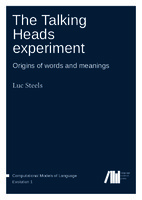The Talking Heads experiment: Origins of words and meanings
Author(s)
Steels, Luc
Collection
Knowledge Unlatched (KU)Language
EnglishAbstract
The Talking Heads Experiment, conducted in the years 1999-2001, was the first large-scale experiment in which open populations of situated embodied agents created for the first time ever a new shared vocabulary by playing language games about real world scenes in front of them. The agents could teleport to different physical sites in the world through the Internet. Sites, in Antwerp, Brussels, Paris, Tokyo, London, Cambridge and several other locations were linked into the network. Humans could interact with the robotic agents either on site or remotely through the Internet and thus influence the evolving ontologies and languages of the artificial agents. The present book describes in detail the motivation, the cognitive mechanisms used by the agents, the various installations of the Talking Heads, the experimental results that were obtained, and the interaction with humans. It also provides a perspective on what happened in the field after these initial groundbreaking experiments. The book is invaluable reading for anyone interested in the history of agent-based models of language evolution and the future of Artificial Intelligence.
Keywords
shared vocabulary; situated embodied agents; agent-based models; future of artificial intelligence; human-robotic interaction; language in robotics; language evolution; language games; Lexicon; Paris; Semiotics; SyntaxDOI
10.26530/OAPEN_559870ISBN
9783944675428OCN
945782699Publisher
Language Science PressPublisher website
https://langsci-press.org/Publication date and place
2015Grantor
Series
Computational Models of Language Evolution, 1Classification
Linguistics
Artificial intelligence


 Download
Download Web Shop
Web Shop